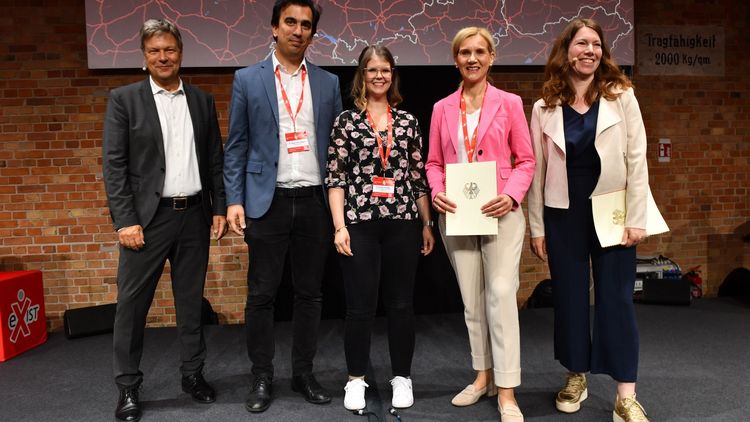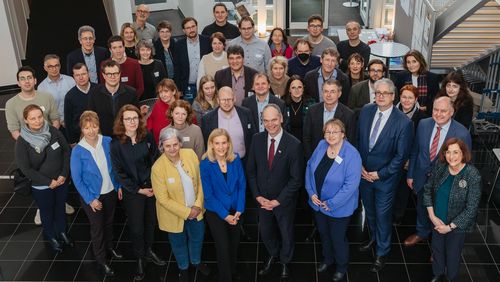The aim of the "Lighthouse Northwest – Shining across Borders" project is to connect the existing start-up support in Lower Saxony and Brement and to create a seamless start-up journey through complementary offers. The universities of Oldenburg and Bremen received funding approval from Robert Habeck.
For this ambitious project, nine regional universities have joined forces under the leadership of the universities of Bremen and Oldenburg with strong support from the regional economy. The project was selected for funding and was honored by Robert Habeck, Vice Chancellor and Federal Minister for Economic Affairs and Climate Protection, at the EXIST Congress to mark the 25th anniversary of federal government support for start-ups. As one of 15 projects nationwide, Lighthouse Northwest will enter the nine-month concept phase of the EXIST-Startup Factories funding line in July 2024.
"Lighthouse Northwest is the 'start-up factory' of the Northwest. The region, with the University of Bremen and the University of Oldenburg, as well as additional universities, and non-university research institutes, is an ideal breeding ground for technology-oriented and knowledge-based start-ups and makes an important contribution to tackling social challenges. In close cooperation with the business community, we want to massively advance the start-up scene here in the region and lead it to international prominence," says Prof. Dr. Jutta Günther, President of the University of Bremen, describing the project.
Ambitious Goals for the Northwest
The objectives are ambitious: As a start-up factory for the entire Bremen/Northwest Lower Saxony region, Lighthouse Northwest will support start-up companies in their foundation and growth phase. The factory is based on a broad alliance of excellent science at universities and a high density of non-university research institutes that is unique in Germany, agile and innovative start-up support, and a traditionally open-minded entrepreneurial community.
"It's all about a paradigm shift: All the stakeholders involved see themselves as a regional, cross-institutional team. This was already evident during the application phase. Whether in academia, start-up support, or companies – the motivation to establish a holistic start-up journey in Northwest Lower Saxony and Bremen with a common mission is immense. The more than 60 expressions of interest from the region are impressive proof of this," says Prof. Dr. Ralph Bruder, President of the Carl von Ossietzky University of Oldenburg.
Support from the Economy
The federal government's start-up funding works as follows: In the concept phase, a viable and innovative business model is developed for a so-called start-up factory. The federal government can then support this model with up to 10 million euros over a period of 5 years. The second half of the funding must come from private sector investment. After the funding period, the factory should be self-sustaining and permanently available to the region. Thanks to the support of the Bremen Chamber of Commerce – IHK for Bremen and Bremerhaven, the Oldenburg-based chemistry company BÜFA Group, the Oldenburg Chamber of Industry and Commerce, and other regional players, it has already been possible to obtain significant letters of intent for the funding of the start-up factory. "The northern German economy is supporting the Lighthouse Northwest project with great pleasure and strong enthusiasm. We are convinced that this initiative will further strengthen the start-up scene in our region," explains Eduard Dubbers-Albrecht, President of the Bremen Chamber of Commerce. Felix Thalmann, chairperson of the University of Oldenburg's University Council and CEO of BÜFA Group, also confirms this: "The support from the region's business community was unprecedented and is a crucial building block for the success of the start-up factory."
Start-up Support at Universities
The start-up support at the lead locations of Bremen and Oldenburg is a success story: Since its establishment in 2012, the University of Oldenburg's Start-up and Innovation Center (GIZ) has supervised more than 600 start-up projects, from which 148 companies have been founded – many of which have been awarded top-class prizes. BRIDGE is a partnership between Bremen's universities and Bremer Aufbau-Bank that has been in existence for over 20 years. BRIDGE, which is part of UniTransfer – University of Bremen Transfer Office, is the central point of contact for students, alumni, and members of Bremen's universities when it comes to business start-ups. Three components are offered to provide support in all phases of the start-up process: practical events, counseling, and the CAMPUSiDEEN competition. The BRIDGE network registers approximately 20 start-ups per year from Bremen's universities.
In addition to the universities of Bremen and Oldenburg, Bremen University of Applied Sciences, Jade University of Applied Sciences Wilhelmshaven/Oldenburg/Elsfleth, Emden/Leer University of Applied Sciences, the University of Vechta, Bremerhaven University of Applied Sciences, Constructor University Bremen, and Bremen University of the Arts are supporting the Lighthouse Northwest project.




